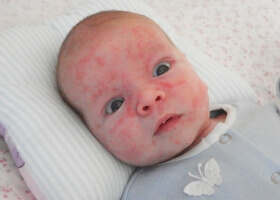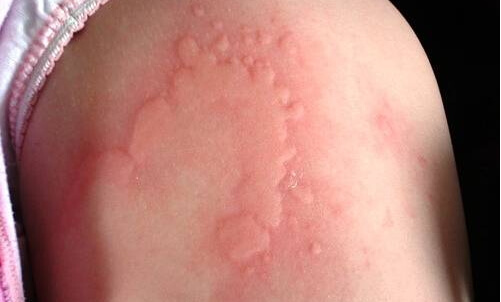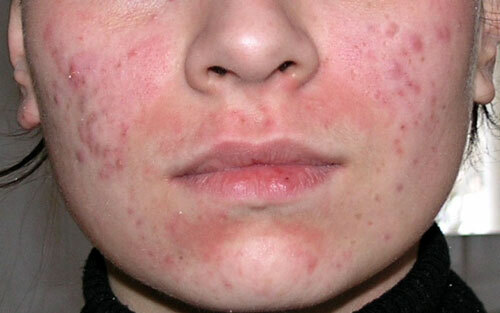Allergy in an infant
 Allergy in an infant is a very common phenomenon, manifested in rashes, mainly on food, and occurs in heavier forms than in adults. Breastfeeding mothers mistakenly believe that this type of food will always save a crumb from allergies. But allergens can also be found in breast milk.
Allergy in an infant is a very common phenomenon, manifested in rashes, mainly on food, and occurs in heavier forms than in adults. Breastfeeding mothers mistakenly believe that this type of food will always save a crumb from allergies. But allergens can also be found in breast milk.
And how do you know the beginning symptoms of an allergy in a child, and then protect your baby's parents?
Immune reactions that trigger allergies are called allergens. Containing proteins in the food cause food allergy. There is the ability of some food allergens to increase their properties in the process of cooking, while others to lose allergenicity.
In the baby's body, the immunoglobulins E are synthesized on the allergen, which in turn activate the reactions leading to the development of allergic symptoms.
Often, an allergy in an infant begins after the ingestion of a product containing an allergen, but there is a delayed allergic reaction, manifested after a few hours.
Allergy in an infant - symptoms
If the child has a food allergy, the symptoms on the skin are: a rash all over the body, Redness, peeling of the skin of the cheeks( diathesis), pruritus, intertrigo, abundant sweating, gneiss( scales and scaling on the head, and also the eyebrows), angioedema, hives.
Symptoms of allergies in the infant that affect the gastrointestinal tract are vomiting, regurgitation, constipation, loose stools with foamy or greasy, colic, flatulence.
Symptoms of allergies, such as respiratory disorders in the infant such: allergic rhinitis, bronchospasm.
The greatest danger to the infant is the swelling of the Quincke. In the larynx of the baby, suffocation begins, very much like a symptomatic attack of bronchial asthma. First, there is hoarseness of the voice, then barking cough and shortness of breath with noisy breathing. The complexion changes, getting a bluish tinge turning into a sharply pale one.
Symptoms of allergies can be combined with damage to the skin, bronchi, and intestines.
The food allergy itself can predate other allergic diseases: bronchial asthma, atopic dermatitis
Allergies in the infant - the causes of
Moms have questions: where does the toddlers take allergic manifestations. If a nursing mother sins with a diet, consuming high-calorie foods, this can be the main reason, and if the baby is on artificial feeding, then the reason is the products used.
Increases the likelihood of food allergies in infants due to heredity. If the allergy was earlier in one of the parents, then the risk of developing such a disease in a baby reaches 37%, and in case of illness of both parents - the risk rises to 62%.
The next factor that causes an allergic reaction in infants is oxygen deficiency( fetal hypoxia).This happens if the pregnancy and childbirth of the child were severe in combination with acute respiratory-viral, as well as intestinal infections. Food allergy in an infant depends on the functional characteristics of the digestive tract. And for the newborn is characterized by the presence of increased permeability of the mucous membranes, since it is easy to allergens penetrate into the blood.
Smoking during pregnancy, an overdose of antibiotic therapy during treatment, the presence of a cardiovascular disease in the future mother, as well as bronchopulmonary diseases affects the children's body negatively, and you are provided with an allergy in an infant.
Those mothers who consumed eggs, caviar, milk, seafood, red and orange fruits, kiwi, vegetables, as well as juices from them, coffee, mushrooms, cocoa, nuts, chocolate, honey, Child of a future allergy
Diagnosis of an allergy in a child
If an infant has any allergy symptoms, then a consultation with a pediatric allergist, pediatrician or nutritionist is necessary. With pronounced manifestations of food allergic reaction, as well as the presence of skin rashes and malfunctions in the work of the gastrointestinal tract, a mother with an infant is hospitalized in a hospital.
Diagnosis of allergies begins with a survey of parents, an examination of the infant, identification of the connections between the food intake, mandatory blood test( for reliability from the vein), ultrasound examination of the abdominal cavity organs.
A high level of total immunoglobulin E, as well as an elevated level of eosinophils from a blood test, indicates an allergic reaction.
Indirect evidence of the presence of allergies in the infant is the disappearance of symptoms after stopping the maternal allergenic products, as well as using anti-allergy drugs.
An additional help in diagnosing an allergy is a food diary in which you can trace the baby's food and drink
Allergy in an infant - treatment
The diet comes to the fore in the treatment of allergies in an infant and thus eliminates the causative food allergen. But each case is treated individually by the doctor, otherwise the mother may aggravate the situation.
If you notice bronchospasm in an infant, accompanied by an allergic swelling, do not hesitate and call for an ambulance. Consult with ambulance doctors how much antihistamine drug to give babies from your home, such as Fenistil drops.
When a baby is naturally breastfed, the mother's diet is revised and products related to industrial production( crystalline sugar, fat emulsifiers, artificial colors, preservatives, colorants) are excluded. At the same time, salt and sugar, fried foods and strong broths are removed from the diet. Restriction is given to dairy products, and the main emphasis is on natural feeding
Recommendations for lactating mothers
The following high-allergenic foods should be excluded from the menu: chicken eggs, fish, caviar, seafood, honey, nuts, chocolate, coffee, mushrooms, cocoa, fruits, vegetables, Berries red and orange, kiwi, radish, radish, avocado, pineapple, grapes, marinades, broths, sauerkraut, canned food, spicy and salty dishes, spices, canned food, garlic, onions. We remove from the diet products with dyes, preservatives, sauces, mayonnaise, adzhika, chips, tkemali, ketchup, soft cheeses, sausages, smoked products, sausages, glazed drinks, beer, ham, kvass. Restrictions are obtained such products: sour cream, whole milk, pasta and bakery products of the highest grade, semolina, sugar, confectionery, salt.
The following products are allowed: kefir, cottage cheese, biokefir, acidophilus, bifid, yogurt without additives, hard cheeses, corn, buckwheat, oat, rice;Vegetables, as well as green and white fruits, vegetarian and cereal soups, young beef, pork, turkey, boiled chicken, codfish, pikeperch, hake, vegetable oil, 2nd grade bread, fresh biscuits, compote, tea, mineral water, Mors.
When the baby is on artificial as well as mixed food, it should be assumed that the cause of food allergy was the proteins of cow's milk. In this case, we replace the milk formula with a specialized hypoallergenic.
When finding out the source of allergy, this product is excluded from the baby's diet. This diet is observed up to three months, and as a result, the symptoms of food allergy gradually decrease.
Doctors appoint babies adsorbents, antihistamines, creams, ointments for skin treatment, hormones
Prevention of allergies in the child
Remember the simple rules: if your baby is allergic, then until the baby reaches the age of six months, we do not give the lure. And such products as eggs, fish, citrus, cow's milk, wheat, nuts, we enter into food after two years. Remember that any of these products can trigger an allergic reaction. To prevent the occurrence of allergies, follow the emptying of the baby's intestines, do not use syrups with dyes when treating other diseases, use only hypoallergenic cosmetics for children, limit water procedures to 20 minutes, pre-stand water and filter, avoid bathing in chlorinated water, do not rub the baby's skin with washcloths, After bathing gently pat the skin of the baby with a towel, moisten the skin with special means, the baby's clothes should be made of soft tissues, blankets and pillows shouldConsist of synthetic fillers, babe rational clothes, avoiding overheating, use for games toys that are safe by age, clean pets and watch the cleanliness of the air, walk more with the child.
Many parents are concerned about whether the allergy symptoms in a child will stop with age? They will stop, but only on condition of timely early treatment and improvement of the liver, intestine, and immune system of the baby.



